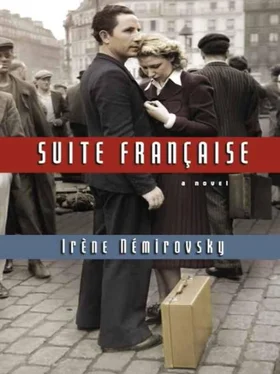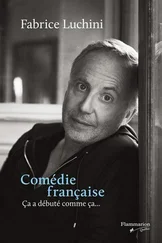"What a terrible sight," said Lucile, upset.
In spite of everything there was something comical about the room and especially about the sheepish expression on the faces of the soldiers and the officer.
Seeing the look of reproach on Lucile's face, the officer said sharply, "My parents used to have a villa on the Rhine. Your soldiers occupied it during the last war. They smashed rare, priceless musical instruments that had been in the family for two hundred years and tore up books that once belonged to Goethe."
Lucile couldn't help but smile; he was defending himself in the same crude and indignant way a little boy does when accused of some misdeed: "But I wasn't the one who started it, it was the others…"
She felt a very feminine pleasure, an almost sensual, sweet sensation at seeing this childish look on a face that was, after all, the face of an implacable enemy, a hardened warrior. For we can't pretend, she thought, that we aren't all in his hands. We're defenceless. If we still have our lives and our possessions, it's only because of his goodwill. She was almost afraid of the feelings growing within her. It was like stroking a wild animal-an exquisitely intense sensation, a mixture of tenderness and terror.
Wanting to hold on to the feeling a little longer, she frowned. "You should be ashamed! These empty houses were under the protection of the German army, the honour of the German army!"
As he listened to her, he lightly tapped the back of his boots with his riding crop. He turned towards his soldiers and gave them a good dressing down. Lucile realised he was ordering them to get the house back in order, to fix what had been broken, to polish the floors and the furniture. His voice, when he spoke German, especially with that commanding tone, took on a sharp, resonant quality. Hearing it gave Lucile the same pleasure that a slightly rough kiss might-the kind of kiss that ends with a little bite. She slowly brought her hands to her burning face: Stop it! she said to herself. Stop thinking about him; you're asking for trouble.
She took a few steps towards the door. "I'm going home. You have the list; you can ask your soldiers to find everything."
In a flash he was by her side. "Please don't go away angry, I beg of you. Everything will be repaired as well as possible, I give you my word. Listen! Let's let them look for everything; they can put it all in a wheelbarrow and, under supervision from you, take it straight over to the Perrin ladies. I'll go with you to apologise. I can't do more than that. In the meantime, come into the garden. We could go for a little walk and I'll pick some beautiful flowers for you."
"No! I'm going home."
"You can't," he said, taking her by the arm. "You promised the ladies you'd bring them their things. You have to stay and make sure your orders are carried out."
They were outside now, standing on a path bordered with lilacs in full bloom. A multitude of honeybees, bumblebees and wasps were flying all around them, diving into the flowers, drinking their honey and settling on Lucile's arms and hair; she was frightened and laughed nervously.
"We can't stay here. Everywhere I go is dangerous!"
"Let's walk on a little further."
They came across the village children at the back of the garden. Some of them were playing in the flower beds where everything had been pulled up and trampled; others had climbed the pear trees and were breaking off the branches.
"Little beasts," said Lucile. "There'll be no fruit this year."
"Yes, but the flowers are so beautiful."
He stretched out his arms and the children threw him some small branches with clusters of delicate petals.
"Take them, Madame; the petals will be wonderful in a bowl on the table."
"I would never dare walk through the village carrying branches from a fruit tree," Lucile protested, laughing. "Just wait, you little devils! The policemen will catch you."
"Not a chance," said a little girl in a black smock.
She was eating a jam sandwich while wrapping her dirty little legs round a tree and climbing up.
"Not a chance. The Bo… the Germans won't let them in."
The lawn hadn't been mowed for two summers and was dotted with buttercups. The officer spread out his large, pale, almost almond-green cape and sat down on the grass. The children had followed them. The little girl in the black smock was picking cowslips; she made big bouquets of the fresh yellow flowers and stuck her nose deep inside them, but her dark eyes, both innocent and crafty, remained fixed on the grown-ups. She looked at Lucile curiously and somewhat critically: the look of one woman to another. She looks scared, she thought. I wonder why she's scared. He's not mean, that officer. I know him; he gives me money, and once he got my balloon that was caught in the branches of the big cedar tree. He's really handsome. More handsome than Daddy and all the boys around here. The lady has a pretty dress.
Surreptitiously she moved closer and touched one of the folds of the dress with her little dirty finger; it was simple, light, made of grey cotton and decorated only with a small collar and cuffs of pleated linen. She tugged on the dress rather hard and Lucile suddenly turned round. The little girl jumped back, but Lucile looked through her with wide, anxious eyes. The little girl could see that the lady had gone very pale and that her lips were trembling. For sure she was afraid of being alone here with the German. As if he would hurt her! He was talking to her so nicely. But then again, he was holding her hand so tightly that there was no way she could escape. All boys were the same, the little girl thought vaguely, whether they were big or small. They liked teasing girls and scaring them. She stretched out in the tall grass which was so high that it hid her from sight. It felt wonderful to be so tiny and invisible, with the grass tickling her neck, her legs, her eyelids…
The German and the lady were talking quietly. He had turned white as a sheet too. Now and again, she could hear him holding back his loud voice, as if he wanted to shout or cry but didn't dare. The little girl couldn't understand anything he said. She vaguely thought he might be talking about his wife and the lady's husband. She heard him say several times: "If you were happy… I see how you live… I know that you're all alone, that your husband has abandoned you… I've asked people in the village." Happy? Wasn't she happy, then, the lady who had such pretty dresses, a beautiful house? Anyway, the lady didn't want him to feel sorry for her, she wanted to leave. She told him to let go of her and to stop talking. My word, it wasn't she who was scared now, it was he, in spite of his big boots and proud look. He was the nervous one now. At that moment a ladybird landed on the little girl's hand. She watched it a while. She wanted to kill it, but she knew it was bad luck to kill one of God's creatures. So she just blew on it, very gently at first, to see it lift its delicate, transparent wings; then she blew with all her might, so that the little insect must have felt it was on a raft caught in a storm at sea. The ladybird flew off. "It's on your arm, Madame," the little girl shouted. Once again, the officer and the lady turned and looked at her but without really seeing her. Meanwhile, the officer made an impatient gesture with his hand, as if he were chasing away a fly. I'm staying right here, the little girl said to herself defiantly. And first of all, what are they doing here? A man and a woman: they should be in the sitting room. Mischievously, she strained to hear them. What were they talking about? "I'll never forget you," said the officer, his voice low and trembling. "Never."
A large cloud covered half the sky; all the fresh, bright colours in the garden turned grey. The lady was picking some little purple flowers and tearing them up.
Читать дальше

![Константин Бальмонт - Константин Бальмонт и поэзия французского языка/Konstantin Balmont et la poésie de langue française [билингва ru-fr]](/books/60875/konstantin-balmont-konstantin-balmont-i-poeziya-francuzskogo-yazyka-konstantin-balmont-et-thumb.webp)










